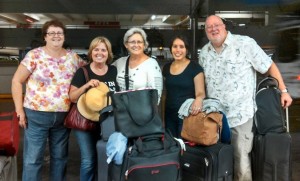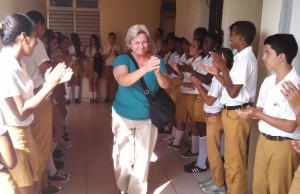South Kern Sol, Question and Answer, Reyna Olaguez
Above: (from left to right) Debbie Wood, Dr. Michelle McLean, Jan Hefner, Veronica Garibay, Bill Phelps.
Months before President Obama’s announcement that the White House would be lifting the decades-old trade embargo with Cuba, delegates from a local community outreach initiative traveled to the island nation to study how it provides healthcare to its citizens.
In late October, Arvin Union School District Superintendent Dr. Michelle McLean and Dignity Health’s Community Wellness Director Jan Heftner, were among a Central California delegation that visited clinics, farming co-ops, schools, and a children’s artist colony in Cuba, speaking with doctors, nurses, teachers and various Cuban residents about how the country provides healthcare for their citizens and how that care impacts their lives.
South Kern Sol spoke with McLean and Heftner to learn more about their trip.
What did you learn from your trip to Cuba?
McLean: Cuba really focuses on education, health and wellness. Cuba has a 97 percent literacy rate for all their citizens, and they also provide free education through college and even medical school. Every Cuban must have a visit with the doctor at least once a year.
Something really unique to Cuba that would be wonderful to replicate here is the way they deliver healthcare. Each neighborhood is divided into areas of approximately 1,500 homes, and each area has their own doctor and nurse who live in a small home in their neighborhood. The doctor and nurse are responsible for the healthcare of everyone in their area as well as for all the health needs of any schools in their area.
Beginning in Kindergarten, all children are taught about health and wellness, illness prevention, nutrition, basic first aid and CPR, and how to avoid unwanted pregnancies and sexually transmitted diseases. The delegation saw very little obesity in children or adults, and there was not really any fast-food or junk food readily available.
Hefner: I learned that technology is not the answer to improving U.S. health outcomes. Cubans benefit from a committed government, a large number of trained medical professionals, and a widespread network of Consultorios, or doctors offices, found in nearly every neighborhood in the country. They also have committed Promotoras, many from the Cuban Federation of Women, who provide much needed human resources to spread the word of health education and prevention.
What’s your response to President Obama’s decision to restart relations with Cuba?
McLean: I am cautiously optimistic. Hopefully this decision will lead to more freedoms for the Cuban people, and the U.S. can help Cubans with basic necessities like medical supplies and equipment. The Cuban people are very hungry for more information, more internet access, and the exchange of ideas, philosophies, and information from others. It would be nice to see the basic living conditions, freedoms, and human rights of Cubans improve.
Hefner: I was very happy to hear the President’s announcement. It’s clear that the time to reconcile with Cuba is here. The people we met were well educated and friendly, and many seemed eager to share the culture and beauty of their country with strangers. The Cuban people will benefit greatly from increased trade with other countries, and their artists, musicians and athletes will gain in stature around the world.
How do you think lifting the embargo will impact the healthcare system in Cuba?
McLean: Ideally the change in how we deal and work with Cuba will lead to more medical supplies and equipment for Cubans and Americans who benefit from their healthcare system, as well as an exchange with Cuba to see what we in America can replicate of the Cuban healthcare system.
Hefner: I hope the Cuban healthcare system will retain its core of accessible care for all residents, with a focus on family care and prevention. I hope physician wages will rise, and more pharmaceuticals and higher-tech diagnostic equipment will be readily available.
Cuban medical schools are known for producing excellent doctors and nurses. Hopefully, these schools will continue to flourish and become an abundant source for medical personnel for Cuba, the U.S. and other countries.
Cuba’s incorporation of health education and practices into schools and their system of Consultorios works, and it’s a big reason why Cuban health indicators rival those of the U.S. and other wealthy countries.


